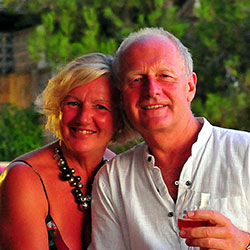Corfu wakes up from its slumbers from between May and September each year when the locals exert themselves to earn a few Euros to see them through the winter sojourn.
Olive groves rest unattended – it’s too much like work (a convenient practice attributed to local patron saint Spyridon who forbade these labours in a vision) – and the narrow rutted roads inland from the coast deter tourists from overcrowding them – in fact tourists are almost confined to certain beaches to avoid cluttering the sleepy charm of Corfu.

Habitually the haunt of the idle rich from time immemorial, throughout the deco twenties up until the more recent attentions of the ‘Kensington set’, the northeast has gained notoriety for its louche reputation, as has tacky Kávos in the south but these are just passing decadent impositions in the same way that annoying relatives are endured until they leave.
Corfu imparts a truly Greek laisse faire style that embraces the visitor wishing to simply enjoy the natural beauty of the island, the narrow side streets of the towns, the company of ancient inhabitants sipping their morning coffee or ambling their way to church.
No hurry, no worry, seems to be the unspoken mantra within Corfu – but it’s no slouch culturally. The grand buildings of Kérkyra Old Town, the east coast capital, make for unbeatable meandering in the warmth of the early summer, whilst several museums of Byzantine, Asian and architectural interest add depth to your strolling.

We enjoyed a stroll to the lighthouse and fortress but it’s hard to believe that anyone could ever have mustered the energy to fight over Corfu, more that these locations provided picturesque viewpoints to gaze out to sea over a leisurely lunch.

Further afield visit the ‘museum village’ of Paleá Períthia, clinging to the slopes of Mt Pandokrátor, which remains architecturally unchanged since Venetian times; before you take advantage of the compulsory siesta between 3-5pm each day.
There’s a quiet arrogance to Corfu but not in an unpleasant way – it’s more of a ‘take us as you find us – but don’t try to change us’ approach to life that gives the visitor a true feeling of having visited somewhere different, original – genuine.

Corfu will invite you in – and take your Euros – but it’s on its own terms, such that you feel a like a guest at the Greek table of hospitality and should respect it accordingly. The colour, patina and ambiance of the island is much as you would have wished the rest of Greece to have retained before it succumbed to tourism on a grand scale and bankruptcy on an even larger one.

There’s little sign of the deprivations of the economy here – not because they don’t exist but because Corfu isn’t ostentatious. It’s quietly dignified in its conduct and as such encourages similar behaviour from its guests.
Go to Corfu when you wish to unwind, to laze on a beach and to absorb the calm and quality of rural Greece, secure in the knowledge that life won’t be disrupted at any minute by modern intrusions of pace and noise.

Rest assured, Corfu does have a pulse – it just beats at a rate that will relax you if you let it; so that you can enjoy its charms and attractions, as Corfu would wish.
Impose nothing, absorb everything on Corfu and it will be a memorable experience.
Avoid the busy mid-summer period of July/August and aim for the beginning and end of summer in June or September. You might be surprised by heavy showers in June or the island steadily winding down by September – but you’ll avoid the heat, humidity and hubbub endured by the ‘skimming stones’ who barely delay long enough to enjoy the beauty of this island paradise before seeking new stimuli. The island is one of the greenest in the Ionian, partly because of the rain, partly because of the three million Olive trees that adorn its slopes; the beaches are as wide and white as any sun-seeker could wish for and the food is sufficiently diverse not to be entirely Greek!
We suspect that, without an agenda, the soporific effects of Corfu could lead to extended leisurely stays that encourage no forward plan yet invite creativity, philosophy and an eventual immunity to Retsina.

A couple of useful links that might tempt you to visit Corfu
Visit Greece official website homepage
Visit Greece Official website – this link takes you to a brief description of Corfu but the website is more of a minefield to navigate
Corfu Travel Guide – a commercial website with more general information than the official one.


























